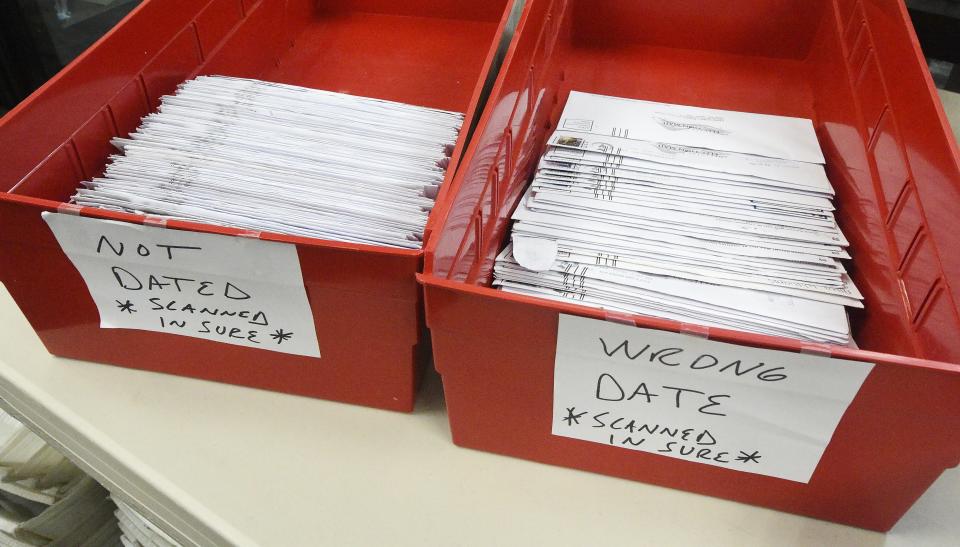In Erie case, NAACP, others seek review of federal appellate ruling on Pa. mail-in ballots
The review process has started for a precedent-setting federal appeals court ruling on mail-in ballots in Pennsylvania — a process that could end up before the U.S. Supreme Court in a case whose final outcome has the potential to influence the 2024 presidential election.
In a voting-rights dispute that originated in U.S. District Court in Erie, the Pennsylvania State Conference of the NAACP and five other civil rights groups have asked the Philadelphia-based 3rd U.S. Circuit Court of Appeals to rehear the case and revisit a decision that a three-judge panel of the court issued on March 27.
The panel, in a 2-1 decision, said election officials in Pennsylvania are barred from counting mail-in ballots that arrive on time but that have inaccurate dates or no dates handwritten on their exterior envelopes.
The panel's majority decision "will needlessly disenfranchise thousands of Pennsylvania voters. If adopted more broadly, it could deny the protection of federal law to literally millions," lawyers representing the NAACP and other plaintiffs said in asking for a rehearing in a filing docketed on Wednesday.

The panel majority's 43-page decision reversed a Nov. 21 ruling from Erie-based U.S. District Judge Susan Paradise Baxter. She said mail-in ballots without dates or accurate dates handwritten on their exterior envelopes must still be counted if they are received in time.
Excluding those ballots would violate the Materiality Provision of the Civil Rights Act of 1964, Baxter ruled in her 77-page decision. She said the provision protects "a citizen's right to vote by forbidding a state actor from disqualifying a voter because of their failure to provide or error in providing some unnecessary information on a voting application or ballot."
The majority of the three-judge 3rd Circuit panel disagreed and sided with the Republican National Committee, which appealed Baxter's decision. The majority found the Materiality Provision applies to voter registration forms but not paperwork related to how a person votes, such as dating requirements on Pennsylvania's mail-in ballots.
Plaintiffs: Question is 'exceptionally important'
The majority's decision spurred the NAACP and the other plaintiffs who lost on appeal to ask for a rehearing before the three-judge panel or for what is known as an en banc hearing before the full 3rd Circuit. The request is the first step in a process that could send the case to the U.S. Supreme Court.

Whatever court makes it, a final ruling will affect how mail-in ballots are counted in Pennsylvania, considered a swing state in the presidential election.
"The panel majority's novel and restrictive interpretation of a sixty-year-old voting rights statute misapplies the rule of statutory construction, directly contradicts a 2022 decision of this Court, and will disenfranchise thousands of eligible Pennsylvania voters, especially seniors of all political stripes," lawyers with the American Civil Liberties Union, which is leading the representation of the group of plaintiffs, said in the rehearing request.
"The panel's majority's construction is not just wrong; it will needlessly disenfranchise thousands of eligible voters in the upcoming elections," according to the request. "In the 2022 mid-term election, more than 10,000 voters' ballots were discarded for the form-dating error. That number could rise in the higher-turnout quadrennial election this year.
"The question presented would be exceptionally important and worthy of review under any circumstances. It is especially so now, with sister circuits set to examine similar issues under the same statute, and with the 2024 election on the horizon. Panel rehearing or a rehearing en banc should be granted."
Dissenting judge said majority's interpretation was 'narrow'
In her decision, Baxter found that elections officials do not use the date on the outer envelope of a mail-in ballot to determine whether to count a vote. Baxter said officials know when a mail-in ballot is returned by scanning a barcode on the return envelope.
On appeal, majority of the 3rd Circuit panel acknowledged that the date requirement "serves little apparent purpose." But the majority said the Materiality Provision does not override Pennsylvania law that "undated or misdated ballots are invalid."
"We hold that the Materiality Provision only applies when the state is determining who may vote," Senior U.S. Circuit Judge Judge Thomas Ambro said in the majority opinion. "In other words, its role stops at the door of the voting place. The Provision does not apply to rules, like the date requirement, that govern how a qualified voter must cast his ballot for it to be counted."
U.S. Circuit Judge Cindy Chung joined the majority. U.S. Circuit Judge Patty Shwartz dissented.
In a 40-page opinion, Shwartz said the "Materiality Provision, in my view, is not limited to that narrow view of documents" used to register to vote.
Democratic presidents appointed Ambro, Chung and Shwartz. Bill Clinton appointed Ambro, Joe Biden appointed Chung and Barack Obama appointed Shwartz.
Obama nominated Baxter, and she was ultimately appointed by Republican President Donald Trump in 2018 to serve in the Erie Division of the Pittsburgh-based U.S. District Court for the Western District of Pennsylvania. Baxter had served as a federal magistrate judge in Erie for more than 23 years.
Contact Ed Palattella at epalattella@timesnews.com. Follow him on X @ETNpalattella.
This article originally appeared on Erie Times-News: In Erie case, review sought of ruling on undated PA mail-in ballots

